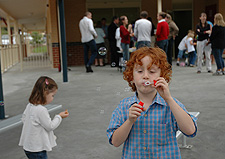Last year John Barnes made the surprising recommendation to pull his congregation out of the Loquat Valley School. They have headed back to the future by moving into the Mona Vale church facilities.
"There was no justification for us meeting in the school," he said. "If anything it was hampering the congregation's ability to reach out to their community because too much energy was being diverted just to duplicate everything needed to run church off site."
In the upcoming April edition of Southern Cross we ask does the Loquat Valley experience herald the end for school-based churches?
Far from it, says John Barnes.
"I'm a big fan of school-based churches but we weren't one. We were not sufficiently connected to the school."
John believes there is a vast difference between church plants started by Sydney churches that merely meet in schools halls, and the genuine school-based churches - those actually run with the full participation of the school leadership.
"Schools who run churches in order to reach nonchurched families are operating a genuine missionary activity," he says.
 A preliminary report based on the 2001 National Church Life Survey backs John's assessment. It raised a question over whether most growth in Sydney church plants was actually Christians transferring from other churches.
A preliminary report based on the 2001 National Church Life Survey backs John's assessment. It raised a question over whether most growth in Sydney church plants was actually Christians transferring from other churches.
More work needs to be done to work out what factors help church plants buck this trend. The available data is incomplete and fragmentary. A fuller picture will become clearer over the next few months as the 2006 National Church Life Survey data is released and then analysed.
However, piecing together the fragmentary data with anecdotal reports from the ground suggests that churches run in partnership with Anglican school plants are doing something fairly unique " they are growing very fast by exclusively drawing on an unchurched population, and with virtually no transfer growth.
The April edition of Southern Cross will profile four school-based churches " Arndell, Macarthur, Kings, and Penrith Anglican College " that bear out this thesis. The article examines the factors they share, while also analysing the issues that have seen some other school-based churches struggle.
Can a parish run a school-based church?

A critical question churches will ask is: can a parish plant a school-based church without at least an equal partnership with the host school?
An experimental church plant run by Springwood-Winmalee Anglican Church will test the boundaries of the existing strategy.
Just a handful of families from the parish have a connection with Blue Mountains Grammar Prep School. The prayer is that some of these will join the existing team of 20 adults and assorted children drawn from across the parish's seven congregations.
Nevertheless the parish has been working hard over the last couple of years to build a relationship with the school community.
The Rev Craig Schafer, his wife Julie and a team of volunteers have been helping to run a lunchtime group at the school called "Kingdom Kids' for the last 18 months. The school choir participates in a few family services at the other congregation Craig pastors.
"I'm also involved in chapel for the kids at least once a term which is good fun," says Craig. "The other week the head teacher made the comment that she just thought of me as part of the school community, which was a sign of good progress."
Craig wants to build on the existing relationship by developing service projects the new church can do to benefit the school community, and by running other bridge-building initiatives, such as parenting courses.
Craig says the starting point is "to keep evangelistic prayer front and centre'.
"We never want to forget that this is God's work and we get to participate in it, not the other way around," he says.
The team is letterboxing, door knocking and is involved in some community projects to build their profile. However Craig says personal evangelism is key.
He will be surprised if they have teachers in the early days. "Most of them are Christian and active members of existing churches.
"I hope that we are able to pick up some school families in the launch phase who have had some contact with the parish and we are praying that others will come out of the woodwork."
Unlike some of the other school-based churches, including Arndell and Penrith, the village of Valley Heights does not have a growing population, so there is no demographic wave to ride.
"We could end up just attracting existing disciples from other places, which could give us the illusion of kingdom growth, and distracting from our focus on evangelism," says Craig. "We could get sick of rejection and blunt the edges of the gospel in our evangelism.
"These things I pray about regularly."






















